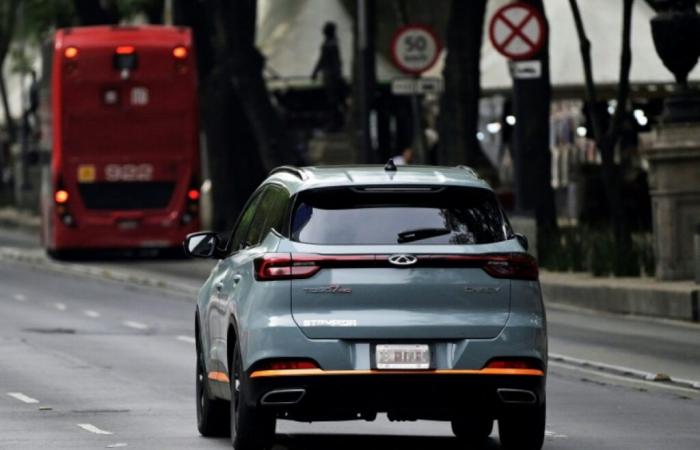A car from a Chinese brand drives on the Paseo de la Reforma in Mexico City on December 23, 2024. (AFP / ALFREDO ESTRELLA)
BAIC, JMC, Changan, BYD: invisible a few years ago in Mexico, Chinese cars are gaining market share in the high-end sector, against a backdrop of decline in European sedans.
The feat is significant in a country linked by a free trade agreement with the United States, vigilant over Chinese imports, and where the German giants Audi, Volkswagen and BMW have factories.
From January to November last year, Audi sales fell by 21.9%, while BMW stagnated, according to the Mexican Automobile Distributors Association (AMDA).
Mercedes-Benz recorded a decline of 9.8%.
In the first 11 months of this year, Motornation, which sells the BAIC, JMC and Changan brands, recorded an 8.8 percent increase in sales, while those of China’s Jetour rose 131 percent, according to the AMDA.
These Chinese manufacturers already control 9.3% of the market.
Chinese brands offer the advantages of high-end cars at “a lower price” than the competition, Guillermo Rosales, president of AMDA, tells AFP
– “Simple arithmetic” –
Consumers are attracted by the comfort, technology and prices of Chinese vehicles, industry sources explain.
For Miguel Reyes, 71, choosing a Chinese car was “simple arithmetic”.
“I needed a car that offered the necessary technology like safer driving aids,” he says in front of the SUV he just bought in Mexico.
In addition to appreciating the design and comfort of the vehicle, he highlights its “competitive” price. The retiree paid around 550,000 pesos, or a little over $27,000, for the most equipped version.
A similar model with traditional brands would have cost him between $40,000 and $50,000, he assures.
Mexico has around thirty Chinese brands covering all ranges, “from compact vehicles to luxury and sports vehicles”, underlines Gerardo Gomez, of the consulting company JD Power.
The Chinese BYD, for example, offers an electric pick-up for more than a million pesos ($50,000) but also a compact vehicle for $17,000, while the Asian Zeekr sells luxury models for around $40,000.
– Tensions around Trump –
Regarding Chinese electric cars, Chinese brands benefited from an exemption from customs duties in Mexico which lasted four years until October 1, 2024.
The growing presence of Chinese cars in Mexico, a major vehicle exporter, comes at a time when China is a source of discord between the United States, Mexico and Canada, partners in a free trade agreement.
During the campaign, US President-elect Donald Trump claimed that China was building automobile factories in Mexico to sell its vehicles in the United States. Canadian officials accuse Mexico of being a springboard for Chinese products in the region, which Mexican authorities refute.
But according to Mexican President Claudia Sheinbaum, vehicles assembled in China face high customs taxes in the United States and Canada, making their entry impossible. And those produced in her country only contain 7% Chinese components, she assures.
“There is no evidence anywhere that Mexico is this springboard” for Chinese products, maintains Diego Marroquin, trade policy specialist at the Wilson Center in the United States. “It’s a political narrative that comes from the United States and now Canada.”
Since his election, Donald Trump has also threatened to impose a 25% customs duty on Canada and Mexico, accusing them of adopting a passive attitude towards illegal immigration and drug trafficking.
Ms. Sheinbaum announced at the end of November that she would propose to the United States and Canada a plan to replace Chinese imports under the CUSMA free trade treaty, emphasizing that, in the case of Mexico, the trade deficit with the Asian giant amounted to 80 billion dollars.
In addition to taxing the import of Chinese cars, Mexico has also just announced taxes on Chinese textile products (35% on the import of 138 ready-to-wear products, and 15% on 17 types of goods textiles).






